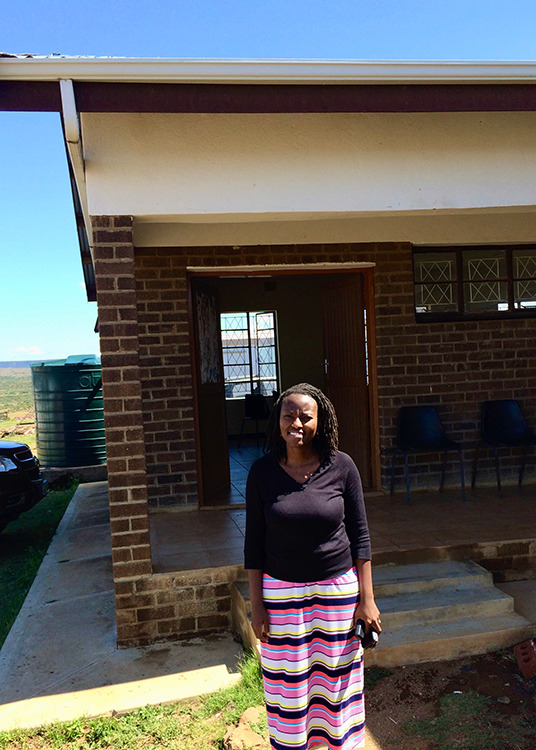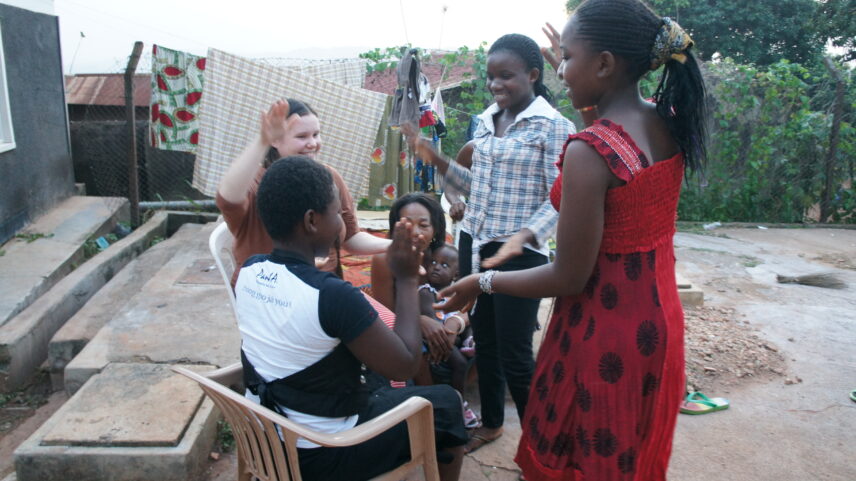Article begins
This spring, the co-editors of APLA Section News met to have coffee with the new editors of Political and Legal Anthropology Review (PoLAR), Sindiso Mnisi Weeks and Georgina Ramsay. We got to know Sindiso and Georgina and their views on timely topics: pathways into anthropology, bridges between anthropology and activism, and the future of journals in the age of the attention economy.
Gwen Burnyeat: Sindiso, tell us about the trajectory that led you to anthropology.
Sindiso Mnisi Weeks: I accidentally found myself in anthropology. I’m from South Africa and studied language and philosophy at the University of Cape Town and got really into African Studies and postcolonial critique. Then, I went to law school. I was frustrated by the fact that while South Africa is 90 percent people of color, in the law program, 97 percent of the content was “white.” There was only one customary law course in the degree. During my studies, the Constitutional Court heard a case on women’s rights to inheritance under customary law and made a decision I felt was wrong. That led me to study the relationship between indigenous and state law in South Africa, and I ended up doing an ethnography of the bottom-up view of indigenous law and its evolution. I felt the Court had tried to make sense of customary law from a top-down, textbook perspective, and I was interested in what people were actually doing. That’s how I ended up getting into anthropology.

GB: Georgina, what about you?
Georgina Ramsay: I never planned to be an anthropologist. I don’t know that many people do, actually!
GB: Totally—I studied literature then did human rights work in Colombia before retraining as an anthropologist. Accidental anthropologists are the best kind!
GR: I did a bachelor’s in social science in Australia, where I’m from. I started off wanting to do psychology because I wanted to study human behavior. But my first psychology lecture really objectified human behavior, and I felt quite lost. I hated my first anthropology class, too. The entire course discussed Captain Cook being eaten by people in Hawai’i. But later I took a medical anthropology class, and it articulated a way of thinking about the world that spoke to me: seeing beyond the assumptions we make and how we understand knowledge. That became my major.
Melissa Maceyko: I think we are all accidental anthropologists! I was pre-law and studied political theory and philosophy of language in undergrad.
GB: I find anthropologists’ trajectories fascinating. You always need to do anthropology and something else, be an expert in that thing, and the anthropology of it. Let’s delve more into the relationship between the practical and the scholarly in your experiences. Sindiso, how have you used anthropology to translate between state and indigenous law systems in South Africa?
SMW: I use anthropology’s approach to studying law as it is experienced in the real world. But it’s been hard for me to describe myself as an anthropologist. I think of my work as being more activist because, even though anthropology is such a big tent, I’ve had to combine different fields to create the critical lenses I sought. I did my PhD in Socio-Legal Studies and felt the anthropology that was supported in my program did not include my applied orientation. I therefore found my voice outside the discipline, even though the tools I use and the questions I ask are fundamentally anthropological.
MM: Unfortunately, I had a similar experience of feeling that I was pushed outside anthropology because of applied work. Georgina, what about your experiences in anthropology and activism?
GR: My mother was a community activist, and I unexpectedly found myself following in her footsteps. I started working for an NGO doing advocacy with newly arrived migrants in refugee camps, primarily people from Kenya, Tanzania, and Rwanda. Meanwhile, the state was deporting the children of refugee parents. I hadn’t planned to do a PhD, but the people I worked with encouraged me. The state’s checklists and bureaucracies were violent, they were being silenced in the legal process, and they thought I could help legitimate their struggles. Anthropology gave me that entry point to speak to what I was witnessing in the NGO world from a different perspective. My PhD was intertwined with activism, as I brought a different kind of language to describe the state’s racism toward the migrants, and, through a collaborative process, found a way to say, “This isn’t right.”

GB: It’s a difficult tension to navigate though. In an NGO, you have to advocate the position the NGO’s mandate defines; as an academic, you have to think independently, and stand by your own interpretation of things and say, “This is what I believe.” You might do it in solidarity with an NGO or community, amplifying their voice, but not necessarily with their same words, position, or strategy. The trouble is, scholarship is slow work and activism is fast work, and sometimes you feel you’re not doing enough.
SMW: There’s a tension there, but also a virtue, because it allows you to go really deep, and that’s what I felt was missing on the ground—people are always thinking instrumentally about urgent matters, rather than taking the time to really stew in the complexity and nuances. Anthropology helped me make sense of the dissonance of feeling there’s something unjust going on, but constantly being told, “No, these are the rules. Capitalism, colonialism, legalism, formalism—we need these things to avoid anarchy.” But the reality is not the utopia they keep promising. The legal forms give us the very opposite of order—they give us violence. Not just physical, but epistemic, cultural, and socioeconomic violence.
GR: For me, it was the “best interests” language that wrangled most. “It’s in the best interests of the child to remove them from their family”. Really? I think both Sindiso and I witnessed injustices in our own worlds, and were motivated to explore this through anthropology, from a place of witnessing and wanting to activate change. I encourage people to work in their own communities. I think part of decoloniality is to encourage diverse people to be anthropologists.
GB: I agree—ultimately, isn’t anthropology also about creating good human beings? Equipping people with tools to do good in their community and be more understanding of others? On that note, what role do you see for political and legal anthropology today, amidst global anxieties about the future of humanity given the climate crisis, COVID-19, increasing inequalities, ‘post-truth’ politics, etc?
GR: I think we can provide a language, method, and epistemology that offers what Savannah Shange calls an abolitionist approach to power. Her book Progressive Dystopia is about the politics of how we imagine the future. This idea of the future being grim and defined by crisis is, itself, an epistemological position, which lends itself to narrow views, like seeing conflict and violence as inevitable. Rather than seeing crisis and asking how we can create new solutions to change the world’s course, which is an imperial logic, we can deconstruct where we are, and listen to the voices of people who are already working toward things like climate justice and alternatives to capitalism. Our job is to bring them into the conversation.
MM: I’m glad you’re bringing in an abolitionist viewpoint! It’s important but has been at the margins of anthropology. Sindiso, what about your views on the role of political and legal anthropology today?
SMW: Two keywords come to mind. First is the phrase making visible, and second, the Latin American notion of pluriversality. I think anthropology has always been sensitive to recognizing and learning from diverse ways of seeing the world. We need to sharpen our tools for doing so, to be more respectful of the profound contributions people throughout the world, throughout space and time, have made to understanding reality and creating world systems that are productive, and offer wellbeing, not just economic prosperity. If we’re going to respond effectively to the appropriately disruptive struggles that are playing out in the world right now, which have always been with us in some form, but are more pronounced today, we must better connect past and future in our present imagination.
MM: Great segue to our final question, about the journal. Journals are a more traditional method of knowledge dissemination than new media formats, and there is increased competition for attention. What role do you see journals playing today in advancing scholarship, enabling practical impact, and fostering possibility and creativity?
GR: What do we do with these old-school objects of knowledge production? For early career scholars, journal articles are increasingly placeholders for career advancement, adding a line to your CV. I understand the pressures. I’ve lived it. We could debate their marginalization and exclusivity at the same time because some researchers don’t have the opportunity for their voices to be included among these markers of academic success. And I think journals are undergoing transformations. PoLAR should be a medium for understanding the politics that shape our world, rather than a vessel for publishing only on politics and law. I see our roles as connecting the political to broader areas. Exposing the power structures we all know to be there, not being complicit in violence. I would love to see PoLAR become a place people can visit to understand the things we’ve been discussing: a platform for alternative views, more like a magazine, a curated whole, but with all the rigor we expect from a journal.
SMW: Political and legal anthropology are active subdisciplines. They can’t just discuss and describe what needs to change but must also be part of that change. We want to bring people into the conversation who see the world differently, not perpetuate the racism and imperialism that is part of our profession’s history and continues in many ways today. We are also considering broadening our editorial board. Who says that editorial boards should be exclusively academics, especially in such an applied field?
GB: This has been a fantastic and motivating conversation. Might you have any final words to invite readers to write for PoLAR?
GR: We know submitting a journal article can be an alienating experience, putting it through an online portal and hoping for the best. We want submitting to PoLAR to be a mentoring and collaborative experience.
SMW: I hope PoLAR can be a venue where people feel free to pursue ideas they felt there wasn’t space for within our field. We need to challenge what is representative of the discipline, because that discussion has been problematically determined by distorted and unjust systems of social organization and power relations. When we shut creative impulses out, we shut out people’s contributions, and we can’t afford to do that right now. Our problems are too serious. So, bring all the things you felt weren’t welcome, or you felt there wasn’t space for. We will make space for them in PoLAR.

